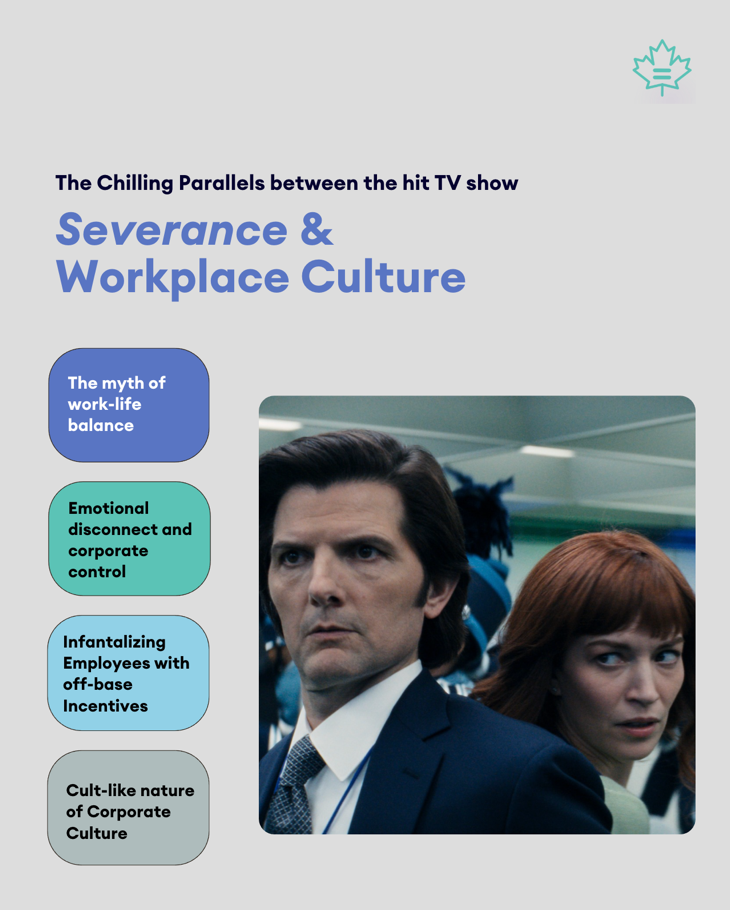
The Chilling Parallels Between Severance and Today’s Workplace Culture
When Severance premiered, it was promoted as a gripping psychological thriller with a unique sci-fi premise. But as the show unfolded, it became clear that its eerie depiction of workplace culture wasn’t entirely fictional—it was an exaggerated mirror reflecting the unsettling realities of modern work environments.
At its core, Severance explores the idea of extreme work-life separation. Employees at Lumon Industries undergo a procedure that severs their memories, creating two distinct selves: their ‘innie’ (the workplace persona) and their ‘outie’ (the personal life persona). While this concept is taken to a dystopian extreme, the underlying themes hit uncomfortably close to home for many workers today.

The Myth of Work-Life Balance
In today’s professional world, work-life balance is often spoken about but rarely achieved. The rise of remote work, hybrid work and digital communication has blurred the boundaries between our jobs and our personal lives. Many employees feel the pressure to be constantly available, checking emails after hours and responding to messages late into the evening. The idea of ‘switching off’ from work is becoming increasingly difficult, much like how the ‘innies’ in Severance never truly leave their jobs.
Emotional Disconnect and Corporate Control
Another disturbing aspect of the show is the way Lumon Industries exerts absolute control over its employees, demanding unwavering loyalty while stripping them of any meaningful autonomy. In many workplaces today, employees feel a similar lack of agency, expected to conform to rigid corporate structures, follow arbitrary rules, and suppress their personal identities to fit the company culture.
Toxic work environments often discourage emotional expression, prioritizing productivity over employee well-being. Workers are sometimes expected to leave their problems at the door, much like the ‘innies’ in Severance who have no knowledge of their personal struggles outside of work. This emotional detachment may not be enforced through brain surgery, but the effect can feel just as dehumanizing.
Infantilizing Employees with Off-Base Incentives
One of the more unsettling aspects of Severance is how Lumon Industries rewards employees with trivial, almost childlike incentives—waffle parties, finger traps, and dance breaks—as a way to maintain control and boost morale. While exaggerated, this practice mirrors how some real-world companies attempt to mask deeper workplace issues with superficial perks. Instead of addressing concerns like fair wages, work-life balance, and career growth, many organizations rely on gimmicky rewards like pizza parties or casual Fridays to create the illusion of a positive work environment. These tactics can feel patronizing, reducing employees to children in need of distractions rather than professionals deserving of meaningful recognition and support.
The Cult-Like Nature of Corporate Culture
Lumon Industries operates like a cult, with its employees worshipping company slogans, performing ritualistic office tasks, and accepting bizarre corporate hierarchies without question. While this is a satirical take, real-world companies often engage in similar practices—indoctrinating employees with motivational speeches, enforcing rigid company values, and creating a culture where questioning authority is discouraged.
Many workers feel trapped in a system where their professional identity becomes their entire self-worth, leading to burnout, stress, and a lack of personal fulfillment outside of their job roles.
Are We Really That Different?
Though Severance takes workplace themes to an extreme, it forces us to ask difficult questions: Are we really in control of our work lives, or have we passively accepted unhealthy norms? Have we sacrificed too much of our personal identities for the sake of productivity? And most importantly, what would it take to create workplaces that truly respect boundaries, autonomy, and human dignity?
As companies strive to improve workplace culture, Severance serves as both a warning and an opportunity for reflection. The best workplaces don’t just focus on maximizing efficiency—they prioritize employee well-being, foster environments of trust and respect, and recognize that workers are more than just their job titles.
Because at the end of the day, we all deserve more than just being ‘innies’ or ‘outies’—we deserve to be whole.

